US plunges into recession as inflation hammers world’s biggest economy
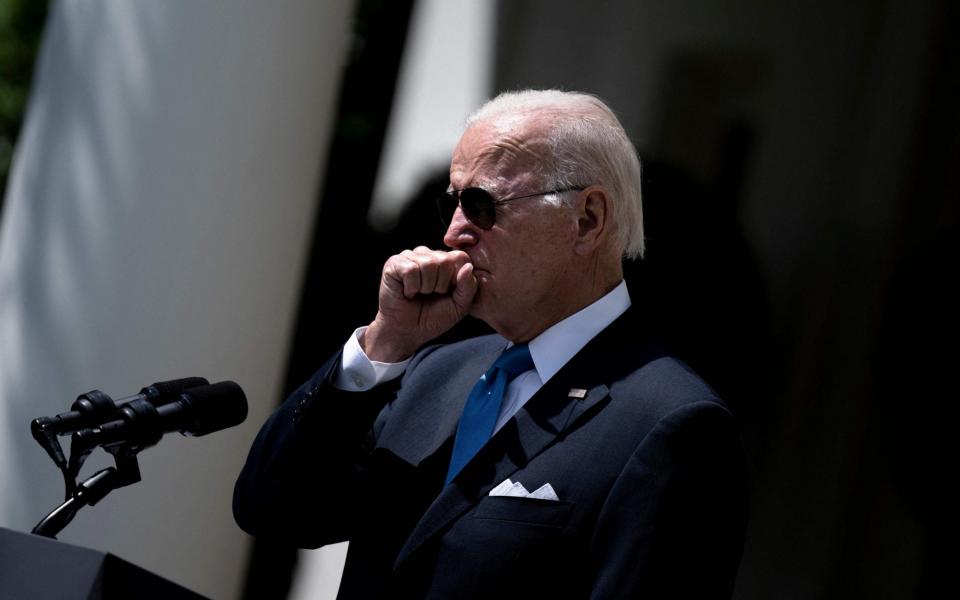
Joe Biden has insisted that the US is not in a recession despite after official figures showed the world’s biggest economy had shrunk in two consecutive quarters.
The US President said the downturn was “no surprise”, pinning it on waning momentum and the Federal Reserve’s efforts to curb inflation. But pointing to record low unemployment, he added: “That doesn’t sound like a recession to me.”
GDP fell at an annualised pace of 0.9pc between April and June, compounding a 1.6pc decline in the first quarter.
Back-to-back periods of consecutive negative growth fit the widely-accepted definition of a technical recession, though academics at the US’s National Bureau of Economic Research will have the final say as to whether the period is recorded as an official downturn.
Economists say they may not categorise it as a recession due to the strong labour market and consumer spending growth.
However, the headline figure overshadowed news that Mr Biden’s stalled economic agenda had reached a surprise breakthrough in its landmark $369bn (£303bn) climate change deal.
Mr Biden said: "There's no doubt we expect growth to be slower than last year, the rapid clip we had, but that's consistent with the transition to a stable, steady growth and lower inflation.
"If you look at our job market, consumer spending, business investment, we see signs of economic progress in the second quarter as well."
The slowdown came as the Fed undertook a historic series of rate increases to curb inflation, which has soared to a four-decade high in the wake of the pandemic.
It was seized upon by the US Republican Party to criticise Mr Biden’s handling of the economy ahead of midterm elections this autumn.
Mike Pompeo, the former secretary of state, was among those criticising Mr Biden. “No matter how Joe Biden wants to define it, Americans know we’re in a recession,” he said.
A contraction in the world’s biggest economy will have severe consequences for other countries due to the global influence of the US consumer, although the nature of the fall in output was extremely unusual.
Personal consumption – a measure of how much US consumers are spending, and a critical bellwether for the health of the global economy – rose by 1pc, although this marked a slowdown from 1.8pc in the previous quarter.
Unlike most downturns, when a fall in activity is accompanied by job losses and business closures, the latest figures suggest America’s labour market is still booming.
The US added around 2.7m jobs over the first half of the year. Cracks are beginning to show, however, with major retailers such as Walmart and Target slashing their profit forecasts and tech giants such as Apple slowing hiring.
Andrew Hunter from Capital Economics said the NBER would not declare a recession, with many indicators “still in expansionary territory”.
James Knightley from ING said: “Officials will say this isn't a ‘real’ recession, but with the squeeze on households intensifying it is only going to be a matter of time.”
Rather than being spurred by a broad downturn in activity, the negative GDP reading was instead down to companies working through swollen inventories.
There was a drag of two percentage points from a slowdown in the buildup of stocks. The reading stunned Wall Street, where economists had been expecting GDP to grow at an annualised pace of 0.4pc.
However, the window of predictions was wide, with forecasts ranging from a 2.1pc contraction to growth of 2pc.
The slowdown is unlikely to deter the Fed from pursuing further aggressive rate increases.
After a 0.75 percentage point increase in its key rate on Wednesday, Mr Powell said “it’s necessary to have growth slow down” to create slack in the economy and ease inflationary pressures.
It came as mounting fears of a winter marred by energy shortages sent confidence in Europe tumbling to its lowest level since lockdown.
Brussels warned of “significant losses” in business and consumer confidence in July as the Kremlin threatens to worsen the cost of living crisis.
In Germany, prices jumped 8.5pc in July in a surprise acceleration after falling back the previous month. The rate of inflation was just short of the record high of 8.7pc hit in May.
The European Commission said its economic sentiment indicator, which tracks confidence among households and firms, “plummeted” 4.5 points to 99 in the eurozone, the lowest level since February 2021.
Meanwhile, consumer confidence has declined to levels last seen at the depths of the financial crisis. European household views on their future finances are at the most pessimistic on record.
Manufacturing and services firms also suffered “significant” deteriorations in sentiment as industrial production expectations slumped to a 20-month low.
06:02 PM
Wrapping up
That's all from us this evening, thank you for following! Before you go, have a look at the latest stories from our reporters:
Russian economy ‘crippled at every level’ despite Putin’s propaganda
UK needs ‘miracle’ to lower energy bills, says Shell as it defends record profit
06:01 PM
Mike Ashley snaps up Boohoo co-founder's fashion website
Mike Ashley’s Frasers has snapped up I Saw It First, the fast-fashion website owned by one of the founders of Boohoo. Laura Onita has the story:
Frasers, which recently bought rival Missguided from administration, told investors that the website will benefit from “the strength and scale of Frasers”. The price of the transaction was not disclosed.
The deal confirmed the Telegraph’s report earlier this month that Frasers was to buy the online retailer, which boasts more than 5m consumers.
Confirmation came as another of Mike Ashley’s investments suffered. Shares in MySale fell by 15pc after a drop in both revenues and profits in the year to June 30.
05:41 PM
FTSE 100 ends flat
The FTSE 100 was subdued today as mixed earnings and worries about the economic outlook outweighed relief following the US Federal Reserve's less hawkish comments that had spurred an overnight rally on Wall Street.
The blue-chip index closed flat at 7,345 .
Banks weighed on Britain's benchmark index, with Barclays losing 4.6pc after the lender's first-half profit fell more than expected due to a £1.9bn hit for regulatory missteps.
"We really need to look at growth data and earnings and I do think the momentum there is somewhat slower ... that's why we're not chasing this rally and maintaining a defensive stance," said Willem Sels, HSBC's global chief investment officer for private banking and wealth.
05:21 PM
Spanish easyJet cabin crew call off strike after reaching pay deal
Spain-based cabin crew at easyJet have suspended a planned strike at the weekend after reaching a deal with the budget airline that includes higher salaries.
The airline's flight attendants in Spain went on strike from July 1 to 3 and again from July 15 to 17. But they have cancelled a further three days of strike action planned for late July after the company offered better pay and benefits in ongoing negotiations.
"After weeks of strike action and months of negotiations, the company has made us an economic proposal that, without being exactly what we were demanding, does represent an important approach to the salaries and conditions of our colleagues in Europe," Miguel Galan, general secretary of union USO said.
The basic salary for easyJet's Spanish staff, which excludes bonuses and extra pay, stands at €950 (£796) – far lower than in countries such as France and Germany, the union leader said.
05:00 PM
Ted Baker meets shareholder rebellion over executive pay

A third of Ted Baker's shareholders have voted against a proposed remuneration package for its top team, the latest in a series of shareholder revolts at British companies.
The policy seeks to pay chief executive Rachel Osborne and chief financial officer Marc Dench bonuses reaching as much as 150pc of base salary, increasing to 200pc“in exceptional circumstances.”
The fashion retailer said it was "naturally disappointed" to see this reaction from 31pc of its investors and said it will "engage with shareholders over the coming months to understand better the reasons behind the result".
This AGM season, Boohoo, Ocado, Informa and Whitbread among others have faced shareholder revolts over pay and bonuses. Earlier this month Sainsbury won a battle against a group of shareholders calling on the UK’s second-largest grocer to adopt a voluntary standard for employers to raise low-paid workers’ wages.
04:38 PM
Pfizer still expects $50bn revenue from Covid products this year
Pfizer has raised the lower end of its profit forecast for the year and reiterated its sales expectations despite unfavorable currency trends, as it continues to project its new Covid products will bring in over $50bn (£41bn) of revenue this year.
The company’s new Covid shot and pill will bring in more half of Pfizer’s sales this year, helping offsetting other slower growing parts of the business. The drugmaker didn’t raise guidance for either of those products though, leaving expectations shy of Wall Street’s projections and raising the prospect that the wave of Covid sales might be peaking.
Shares fell 5pc shortly after open in New York.
04:16 PM
Landmark US climate deal spurs record gains for renewable stocks
Renewable stocks in the US clocked in record gains following a landmark climate deal struck by US Senators Joe Manchin and Chuck Schumer.
Sunrun, the largest US residential-solar installer, jumped as much as 34pc, while TPI Composites, which makes wind-turbine blades, climbed as much as 38pc.
Solar companies have faced a barrage of policy, trade and supply headwinds that slowed development and weighed on stocks. But the $369bn toward energy and climate in the Senate deal announced today promises to stimulate years of growth. That is, if Congress ultimately approves the plan.
“Following many false starts for US climate legislation, and a recent hiatus in US wind orders, we see this as a significant step forward,” Citigroup Inc. analyst Martin Wilkie said in a research note.
03:53 PM
Ticket office workers break with RMT to vote on pay deal
Ticket office staff will vote on an 8pc pay deal in a break with other railway workers that risks undermining union calls for a general strike. Oliver Gill reports:
The Transport Salaried Staffs Association (TSSA) will allow 2,000 of its members to vote on the two-year pay deal, in a blow to staunch union ally the Rail, Maritime and Transport workers union (RMT).
Although the TSSA does not support the offer from Network Rail, the move differs from the approach taken by the RMT, which has refused to put the deal to its members.
03:30 PM
Both Tory leadership candidates support Channel 4 privatisation

The UK appears set to privatise Channel 4 after both Conservative Party candidates vying to be prime minister indicated support for the plan.
Liz Truss told reporters today: “Where possible, it’s best to have companies operating in the private sector rather than the public sector.
“I will look in detail at the business case on Channel 4.”
Rishi Sunak reiterated his stance committing to the policy, with his campaign team pointing to his previous remarks that “privatisation will help Channel 4 to thrive in an age where they are also competing with Netflix, Amazon, Apple and many more: standing still is not an option.”
03:10 PM
Cheap copies of GSK's HIV prevention drug could be ready in 2026
GSK has struck a deal to allow low-cost generic versions of its long-acting HIV preventive medicine to be used in the developing world, including sub-Saharan Africa where the virus remains a leading cause of death.
Each year, roughly 1.5m new cases of HIV are recorded globally, most of which occur in resource-limited countries, and disproportionately impact women and adolescent girls.
The deal involves GSK issuing a voluntary licence – so the intellectual property does not get in the way - to the United Nations-backed healthcare organisation, the Medicines Patent Pool (MPP).
Following that, the MPP offers generic manufacturers the opportunity to apply to make copycat versions of the injected drug, cabotegravir, for the 90 countries that represented 70pc of all new HIV cases in 2020.
02:57 PM
Handing over
That's all from me for today – thanks for following! Handing over now to my colleague Giulia Bottaro.
02:47 PM
'Crazy' lack of staff meant we missed out on property boom, says Foxtons boss
The boss of Foxtons has acknowledged the company missed out on booming property markets due to a 'crazy' lack of staff.
Helen Cahill has more:
The interim chief executive has pledged to hire more front-line workers to boost sales as it seeks to restore profits that have plunged to just £5.6m last year from £42m in 2014.
Peter Rollings said: "We have a lot of stock both for sale and to let…We have a lot of stock and not enough people to sell it, and as far as I'm concerned that's a crazy way to be.
"Investment in new negotiators is the key here and that will cost us money obviously, but this sort of business needs investment for the medium term.
"We have to find, retain and make successful great sales people."
Around a third of businesses are being hampered by staff shortages, according to the Office for National Statistics.
Its research found 35pc of businesses that were not shut down in the pandemic were now experiencing a shortage of workers.
02:35 PM
Wall Street opens flat after GDP data
Wall Street's main indices have opened flat after gloomy forecasts from Meta and Qualcomm and data that showed the US has entered a recession.
The S&P 500 opened 0.06pc higher, while the Dow Jones was unchanged and the tech-heavy Nasdaq edged 0.03pc higher.
02:23 PM
Reaction: Bumpy road ahead for US
Hussain Mehdi at HSBC Asset Management says there's a bumpy road ahead amid slowing growth and surging inflation.
Although the US economy has entered a technical recession this mainly reflects contributions from trade flows and inventory de-stocking. Underlying activity remains buoyed by a strong labour market and a rotation to services spending.
Nevertheless, growth momentum is undoubtedly weakening amid headwinds such as rapid policy tightening, a significant squeeze in real incomes, and falling confidence.
We see a bumpy road ahead as the Fed attempts to rebalance supply and demand in the economy and an elevated risk of recession in the second half of 2023 as rates push into restrictive territory.
In terms of markets, ongoing Fed tightening and a weakening macro backdrop is likely to constrain performance going into year-end. We remain selective and defensive in our asset class positioning.
For us, a relative preference for US equities over other developed markets continues to make sense, with growth and tech stocks likely to be a major beneficiary of a less hawkish Fed policy stance as inflation cools.
02:08 PM
US jobless claims fall slightly
Separate data just now shows applications for US unemployment insurance fell for the first time in four weeks, but they're still holding near the highest level since November.
Initial unemployment claims decreased by 5,000 to 256,000 in the week to July 23, according to the Labor Department.
Continuing claims for state benefits fell to 1.36m in the week to July 16.
Jobless claims have generally been rising in recent months and are hovering near the highest since November, coinciding with an increase in job cuts and hiring freezes at high-profile companies in sectors including technology and housing.
Further weakening in what remains a tight labour market is probably on the horizon after the Federal Reserve confirmed another big interest rate rise to tackle surging inflation.
Still, Fed chair Jerome Powell said the labour market remains “extremely tight,” referencing a near-record number of job openings and historically low unemployment.
01:54 PM
More reaction: US not in recession just yet
Seema Shah, chief strategist at Principal Global Investors, says there are some signs of strength in the US economy still.
Policymakers will no doubt be tying themselves in knots trying to explain why the US economy is not in recession.
However, they make a strong point. While two consecutive quarters of negative growth is technically a recession, other timelier economic data are not consistent with recession.
Certainly, with two job openings per unemployed worker and an average 375,000 jobs being added per quarter, the labour market is a picture of strength.
That is not to say the US economy isn’t slowing. With excess savings being whittled down, consumers are being more price sensitive and more deliberate with purchases, while companies are facing greater margin pressures.
Throw in the most aggressive Fed tightening cycle since the 1980s, and a recession in early 2023 is highly likely.
01:48 PM
Reaction: Outlook for US 'concerning'
Richard Flynn, managing director at Charles Schwab UK, describes the latest numbers as 'concerning'.
Today’s announcement is concerning and reflects weaknesses in the stock market and the outlook for corporate profit margins.
The US economy and stock market both struggled in the first half of 2022, as tighter monetary policy, faster inflation, and slower growth dented consumer and business confidence.
The Fed doled out trillions of dollars’ worth of liquidity during the pandemic, boosting the economy. However, it is now aggressively raising interest rates in a bid to control inflation, meaning that liquidity has dried up.
Tightening financial conditions point to a meaningful economic slowdown. Today’s announcement underscores this risk.
01:42 PM
US economy in 'technical' recession
The latest GDP figures will make for grim reading in the US.
The 0.9pc slump in the second quarter was driven by the second weakest slump in consumption since 2014, as consumers begin to tighten the purse strings amid soaring inflation.
The two straight quarters of contraction mean the US is now in a technical recession. However, you won't hear US officials admitting to this.
The US National Bureau of Economic Research defines a recession as "a significant decline in economic activity spread across the economy, lasting more than a few months, normally visible in production, employment, real income, and other indicators".
🇺🇸Unhealthy recession obsession
Real #GDP Q2 2022:
🔴-0.9% (annualized)
🟡+1.6% y/y
⚠️Massive drag:
▶️Inventories -2pt
GDP
🆚pre-#COVID19 level: +2.5%
🆚pre-#COVID19 trend: -2.9%
🔥Headline PCE #inflation 6.5%
🔥Core inflation 4.8%— Gregory Daco (@GregDaco) July 28, 2022
01:19 PM
Strike threat hits UK's biggest container port Felixstowe
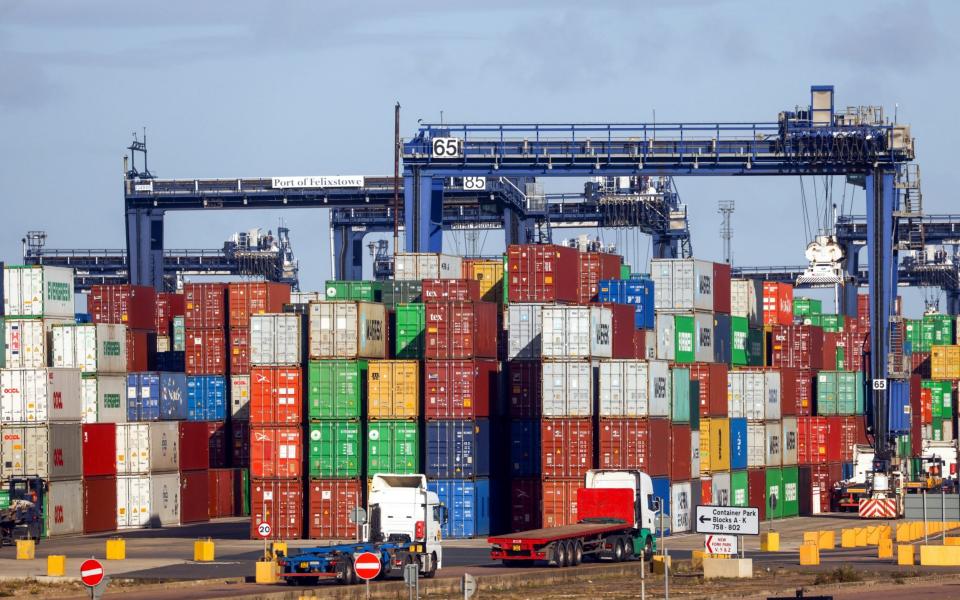
Staff at the UK's largest container port have voted in favour of strike action in a dispute over pay, threatening huge disruption across the supply chain.
The dockworkers at Felixstowe join a growing wave of employees, in a range of sectors from rail to telecoms, resorting to industrial action as pay rises fail to keep pace with inflation which is expected to hit double digits in Britain by the end of the year.
The Unite union said workers at the Suffolk hub, which is operated by Hutchison Ports, had been offered a pay increase of 5pc. Hutchison did not immediately respond to a request for comment.
"Strike action would bring Felixstowe to a standstill and would cause major logistical problems for maritime and road haulage transport entering the port," the union said/
Unite's regional officer Miles Hubbard said the industrial action would "inevitably create huge disruption across the UK’s supply chain".
The union did not give specific dates for the strike action, which will take place next month and was supported by 92pc of workers who voted.
Earlier this month Unite said it was also balloting hundreds of dockworkers in Liverpool for possible strike action.
01:00 PM
Return to office dents Nespresso sales

Workers returning to offices across Europe have dented demand for Nespresso coffee pods in the region, writes Hannah Boland.
Nespresso sales in Europe slipped in the first six months of the year, with parent company Nestle blaming strong sales last year when much of the continent was stuck at home.
A lockdown-driven boom in at-home coffee drinking pushed Nestle to its fastest quarterly sales growth in a decade last year. That proved tough to match as people began spending less time at home.
Official guidance for remote working only changed in the UK last summer, when the Government said workers should gradually start coming back into city centre offices. Since then, footfall in office hubs has been on the rise. Data compiled by Bloomberg using Pret a Manger figures suggested London City footfall hit 89pc of 2019 levels in May. In London's West End, they are currently running at 88pc of pre-Covid levels.
Nestle said sales of its coffee capsules globally ticked 1pc higher in the six months to the end of June, but only because of major growth in North America.
Nestle raised prices of the capsules by 4.2pc in the first six months of the year.
12:28 PM
Russian economy ‘crippled at every level’ despite Putin’s propaganda
Russia’s economy is being “catastrophically” crippled by Western sanctions according to experts, despite Vladimir Putin’s efforts to hide the damage.
Louis Ashworth has more:
Analysts at Yale looking at “private Russian language and unconventional data sources” say imports have “collapsed” and domestic production “has come to a complete standstill”.
Russia has lost companies representing around two-fifths of its GDP amid an exodus of Western businesses, they claim, undoing about three decades of foreign investment.
The pressures are tipping Mr Putin into “unsustainable, dramatic” fiscal and monetary interventions, the report says, claiming “Kremlin finances are in much, much more dire straits than conventionally understood”.
The report, from Yale’s Chief Executive Leadership Institute, describes itself as “one of the first comprehensive economic analyses” of how Russia’s economy is faring five months on from the invasion of Ukraine.
It belies claims that the West, where many countries are grappling with surging inflation spurred by the conflict, is coming off worse than Russia in the war of economic attrition unleashed by unprecedented sanctions.
12:02 PM
US futures dip as Fed rally stalls
US futures dipped this morning as stocks struggled to hold on to gains after last night's Fed rally.
Wall Street enjoyed its biggest jump since November 2020 as investors weighed up the prospect of a slower pace of interest rate rises.
Big Tech will be a particular focus with results from Amazon, Apple and Intel. Shares in social media companies fell in pre-market trading after Meta posted its first-ever sales decline.
Futures tracking the S&P 500 fell 0.3pc while the Dow Jones was down 0.2pc. The tech-heavy Nasdaq lost 0.6pc.
11:42 AM
Liz Truss commits to £43bn high-speed railway through Red Wall
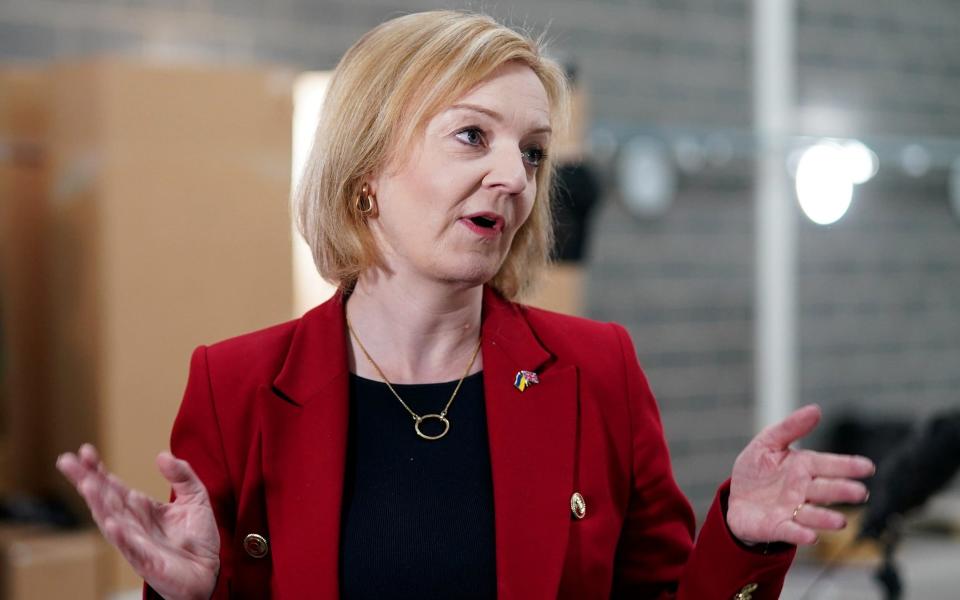
Liz Truss has committed to spend another £26bn to build a high-speed railway through Red Wall seats, writes Oliver Gill.
The Conservative leadership candidate said she would build Northern Powerhouse Rail in full, marking a major climbdown on Boris Johnson’s piecemeal programme of upgrades.
Northern Powerhouse Rail, dubbed “HS3”, is a £43bn railway running from Liverpool to Hull, stretching down as far as Toton, East Midlands and Leeds in the north.
It was originally designed to link in with the now defunct HS2 eastern spur. Ms Truss has ruled out backtracking on a decision to cancel the £32bn eastern leg to Leeds.
Despite his own leadership commitment to the works, Mr Johnson’s government subsequently downgraded Northern Powerhouse Rail to upgrades that would cost £17bn.
Ms Truss’s commitment to build the programme in full will cost an additional £26bn.
11:21 AM
Co-op Bank hands staff £1,000 pay rise
Staff at the Co-operative Bank are to receive a £1,000 pay rise to support them amid the cost-of-living crisis – the latest move to help cash-strapped workers.
The group said around 95pc of its employees will be eligible for the pay rise, which will take effect in September, with only those on the highest salaries not set to benefit.
It comes after the bank already made a one-off cash payment to lower paid staff earlier this year to help them cope with soaring energy, food and fuel bills.
Firms across the banking industry have been handing out cost-of-living payments and salary increases to help struggling workers, including Lloyds Banking Group, Barclays and TSB.
Details of the pay rise were unveiled in the lender's half-year results showing pre-tax profits rebounded to £61.9m from £21.4m a year earlier, helped by higher interest rates boosting its profit margins.
11:04 AM
BT plans another inflation-busting price rise despite cost of living squeeze
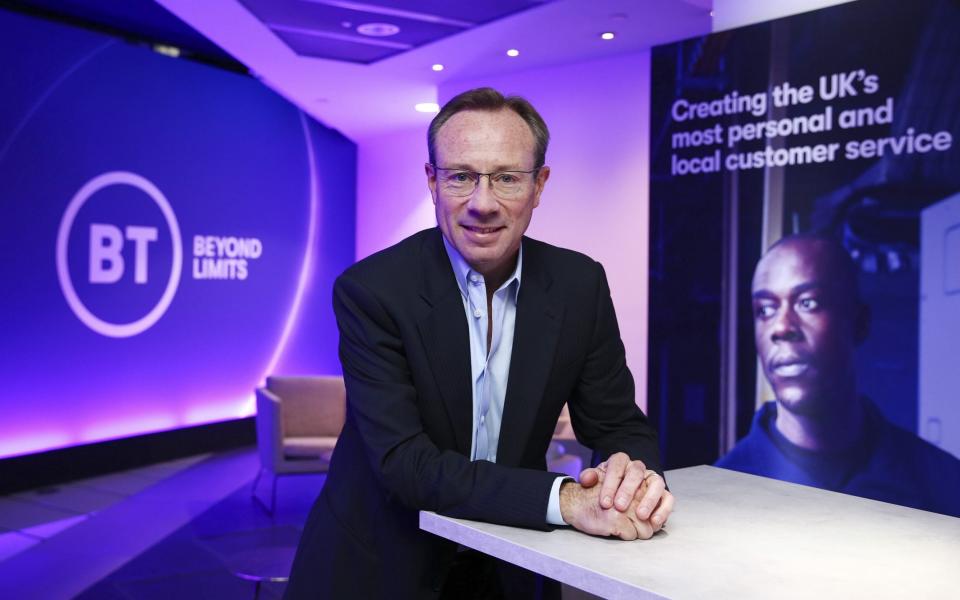
Here's more on BT's update this morning, courtesy of my colleague Matthew Field:
BT is pushing ahead with planned broadband price rises estimated at 13pc next spring, in the latest sign that squeeze on household finances will continue long into 2023.
Philip Jansen, the telecoms company’s chief executive, said inflation-linked price rises would “absolutely” go ahead next April, blaming the “very, very challenging” economic environment and rising costs.
Under BT contracts, customers face annual price increases equal to January’s Consumer Price Index plus 3.9pc. Analysts and the Bank of England estimate inflation will run at around 9pc in early 2023 and not begin to fall until later in the year. That would see the cost of BT broadband contracts rise by about 13pc.
The rise would add about £53 per year to the cost of a typical BT Fibre Essential package, its cheapest standard broadband and phone tariff which costs £33.99 per month. The price increases apply across the company’s broadband, EE mobile and BT Sport packages.
Mr Jansen said he was hopeful inflation “would be on the low side”.
10:43 AM
Recession fears drive eurozone confidence to 17-month low
Confidence in the eurozone has crashed to its weakest in almost a year and a half as fears of energy shortages haunt consumers and businesses.
A gauge compiled by the European Commission dropped to 99 in July from 103.5 the previous month. That's well below the level of 102 forecast by economists.
Consumer confidence led the decline, slumping to its lowest level on record as households fret about the outlook. Worries that an economic contraction is on the horizon grew in 11 of the eurozone's 19 countries – the most since the Covid crisis erupted.
Optimism also dropped among all surveyed sectors, with major decreases in industry and services alongside milder falls in retail and construction.
Europe is on edge as the Kremlin cuts gas supplies to the continent. Inflation also continues to soar, with the ECB's first interest rate rise in more than a decade fuelling concerns of a recession.
10:25 AM
UK probably already in recession, says former BoE official
The UK has probably already tipped into recession and the Bank of England should hold off from further interest rate rises, a former policy maker has said.
Danny Blanchflower, who served on the MPC from 2006 to 2009, said Britain will probably follow other major economies into recession and that unemployment is a bigger threat.
He told the BBC's Today programme: "The UK in all likelihood is already in recession. The right thing to do is to sit back and wait and watch as the global recession probably spreads."
The comments come ahead of the Bank of England's interest rate decision next week. Markets are betting on a 50 basis point rise, which would be the biggest in 27 years.
Mr Blanchflower also criticised the Fed's decision to boost rates by 75 basis points last night, saying "in all likelihood these actions will generate a recession".
10:04 AM
Centrica: Rough gas storage site could be ready for winter
Britain's biggest natural gas storage site could be restore in time for winter, in what would be a major boost for supplies as Russia cuts flows.
Centrica, which owns British Gas and the Rough facility, is still hammering out a deal with the Government including subsidies for getting the closed storage site back in operation.
Capacity would be brought back gradually, providing further relief for surging gas prices next winter too.
Chris O'Shea, chief executive of Centrica, said: "Physically it's possible, but there's a whole bunch of things that we need to go through and we are working on it right now.
"We are right now doing the engineering to make sure that it can physically happen and we're doing that at our own cost."
He added that Centrica will pay to make Rough operational but is seeking longer-term guarantees from the Government on price, such as a contract for difference.
Read more on this story: Britain’s biggest gas storage site on course to reopen by autumn in race to beat Russia
09:45 AM
Shapps issues Khan with final ultimatum over Tube funding
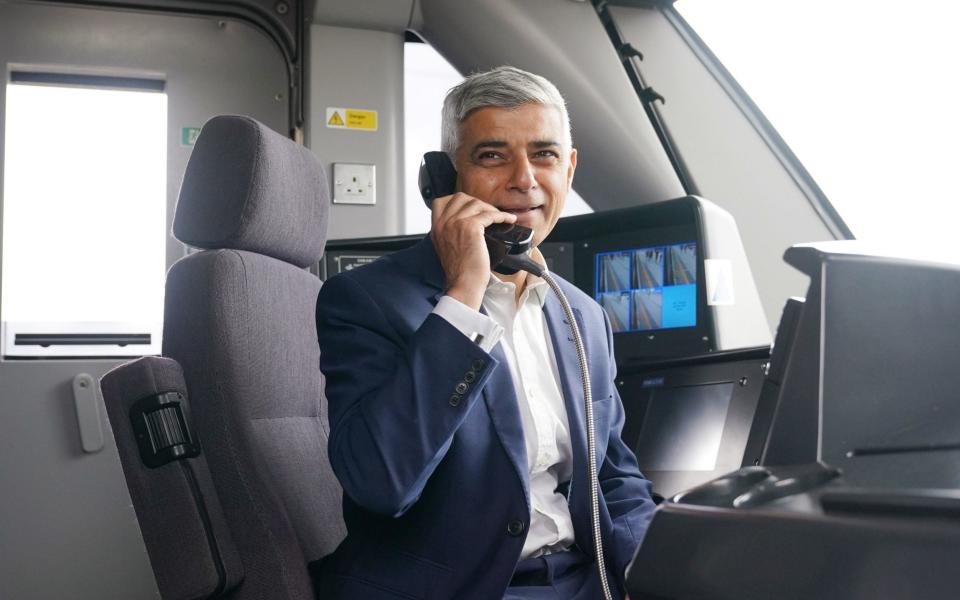
Grant Shapps has issued Sadiq Khan with a final ultimatum to accept taxpayer funding for the London Underground or leave the capital’s transport authority bankrupt, writes Oliver Gill.
The Transport Secretary last night said he had offered Mr Khan, chairman of Transport for London (TfL), £3.6bn to fund new projects over the coming years.
The offer is likely to fall short of Mr Khan’s wishes for billions of pounds to invest in public transport over the coming decade.
He said that officials are “thoroughly reviewing” Mr Shapps’ offer.
"TfL needs to consider if this draft proposal delivers the funding that is needed to avoid having to make painful cuts to London's transport network,” Mr Khan added.
"It's in no-one's interest to have conditions attached to this funding deal which could damage TfL, unfairly punish Londoners or our economic recovery."
TfL has received bailouts of around £5bn from Westminster since the start of the pandemic as a steep fall in fare revenue obliterated the authority’s finances.
Mr Khan has repeatedly demanded billions in “long-term funding” that would make TfL viable and negate the need for further short-term funding.
Mr Shapps and Boris Johnson, however, say any funding must come with strings attached.
09:34 AM
Wind power fund Greencoat quadruples profit
There's another big winner from the energy crisis this morning, although they're not such a household name.
Greencoat UK Wind more than quadrupled its profit in the first half of the year thanks to higher power prices.
The FTSE 250 company posted a profit of £551.6m, up from £116.7m. Part of the increase was from higher generation, as well as accounting measures that adjust for expectations of increased power prices in the year ahead.
Greencoat invests in operational wind farms across Britain. The fund aims to have about half its portfolio exposed to market power prices, with the other half on fixed contracts. This allows it to cash in on higher prices.
Wind power is becoming increasingly important in efforts to wean the UK off expensive fossil fuels. But in the meantime, renewable power generators can still benefit from high prices in the power market.
09:27 AM
FTSE 100 slips into the red
After an upbeat start to trading, the FTSE 100 has now slipped 0.2pc into the red as investors continue to wade through a deluge of results.
Here's a look at some of today's laggards:
Medical manufacturer Smith & Nephew dropped as much as 11pc to the bottom of the blue-chip index after lowering its guidance for profit margins over the full year.
Aveva, the software giant, is down 6.5pc following a trading update that analysts branded "underwhelming".
Telecoms group Airtel Africa tumbled more than 8pc after it first-quarter revenue fell short of estimates.
Meanwhile, BT slumped 6pc even after it returned to sales growth for the first time in five year, while Barclays shed 1.7pc after taking a huge hit from its trading blunder.
09:22 AM
Will Centrica's boss waive his bonus?
As expected, today's bumper results for Shell and British Gas owner Centrica are already starting to ruffle some feathers.
Both companies have said they'll share the spoils with investors, but there are also questions over how well bosses will be remunerated...
Chris O'Shea, boss of British Gas owner Centrica, waived his £1.1million bonus last year. Today he refused to say if he'd do the same this year. Claims it's too early. I humbly disagree.
— Graham Hiscott (@Grahamhiscott) July 28, 2022
09:17 AM
Metro Bank aims to break even next year

Metro Bank has said it expects to break even on a monthly basis in the first quarter of next year after it slimmed down its loss in the first half of the year.
Bank profits have been lifted by successive rate hikes by the Bank of England, enabling lenders to make more money on borrowing, despite the threat to the economy posed by rampant inflation.
Metro Bank said its loan growth expectations were higher for the year as it continues to focus on cost controls and revenue and margin growth. Total net loans at the end of June was £12.4bn.
The lender posted a pre-tax loss of £60m for the six months to the end of June, down from a loss of £139m a year earlier.
Metro Bank said it remained cautious about its outlook amid "heightened levels of global insecurity" including the Ukraine conflict.
09:11 AM
National Grid warns Russian gas cut-off would send prices soaring
While energy prices are already sky high, they could get even worse if Putin cuts gas supplies further.
National Grid has warned that Britain will face "knock-on impacts" such as rocketing prices if Russian flows to Europe are interrupted.
The UK only gets around 6pc of its gas imports from Russia – a number the Government has used to play down the risks. But this is the first time the grid operator has openly addressed the threat from Moscow.
In its early outlook for winter, it said: "It is clear that the cessation of flows of gas into Europe could have knock-on impacts, including very high prices."
09:04 AM
ITV warns of summer ad slump

ITV has warned of a sharp drop in advertising revenues over the summer, but it's hoping for a boost later from the World Cup later in the year.
The Love Island and I'm a Celebrity broadcaster posted a 5pc rise in ad revenues in the first half of the year, but is expecting a fall of 9pc in July and 18pc in August as it comes up against last year's Euros and uncertainty in the wider economy.
Overall, ITV predicts ad revenues will be broadly flat in the nine months to the end of September, while November and December will be pushed higher by the Fifa football tournament.
Its half-year results showed pre-tax profits remained flat at £301m, while operating profits rose 46pc to £228m.
Carolyn McCall, ITV chief executive, said:
Despite the tough comparators of last summer, when the Euros and a rebounding economy drove record advertising revenues, total advertising revenue is expected to be broadly flat in the nine months to the end of September.
We are mindful of the macroeconomic uncertainty; however, we have, for the first time ever in the fourth quarter, the football World Cup to look forward to.
08:58 AM
Pound nears three-month high against euro
Sterling has inched towards a three-month high against the euro and a one-month high against the dollar amid improved sentiment on markets.
With the Tory leadership contest dragging on and investors waiting for next week's Bank of England interest rated decision, there have been few domestic drivers for the pound in recent weeks.
Instead, it's benefited from a weakening dollar and a euro that's struggling amid fears of gas shortages and a weakening economy.
The pound edged up 0.1pc against the euro to 83.79p, close to the three-month high hit yesterday. Against the dollar it was little changed at $1.2161, close to its recent one-month high.
08:52 AM
EDF crashes to €1.3bn loss ahead of nationalisation
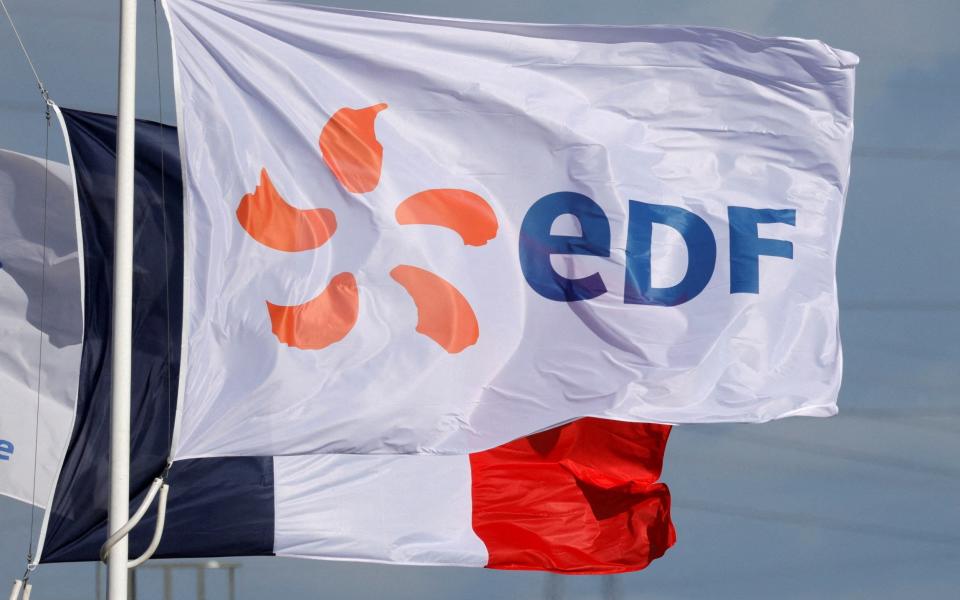
While British energy firms are reeling in huge profits, it's a different story over in France.
EDF has posted an historic loss for the first half of the year as nuclear output slumped in the midst of a severe energy crisis.
The company swung to an adjusted net loss of €1.3bn (£1bn) in the first half, compared to a profit of €3.7bn a year earlier,
The dire figures come as the French state gears up to nationalise the struggling utility by buying the 16pc stake it doesn't already own.
08:40 AM
CMC Markets plummets as it warns on costs
While the wider mood is upbeat this morning, it's a miserable start to the day for CMC Markets.
The online trading platform slumped as much as 21pc, with analysts warning of a slow start to the year.
The company also warned operating costs will be around 5pc above guidance due to higher staff costs, as well as increased fees and software costs and the impact of the weaker pound.
Analysts at Jefferies said the new cost guidance would imply a 10pc cut to full-year profits.
08:36 AM
FTSE risers and fallers
There's a buoyant mood on the FTSE 100 this morning as investors cheer a string of upbeat results.
The blue-chip index gained 0.2pc to hit seven-week highs as it caught up with an overnight rally on Wall Street.
Some of the optimism mirrored gains for US stocks after the Federal Reserve raised interest rates as expected, but eased some concerns over the pace of rate hikes going forward.
Shell was among the biggest boosts, gaining 1.2pc after posting another quarter of record profits. Anglo American jumped 4.4pc despite reporting a 28pc drop in first-half earnings.
Johnnie Walker maker Diageo rose 0.4pc after its sales climbed.
On the negative end, Barclays shed 2.5pc after its profits slumped by more than expected due to a £1.9bn hit from its huge trading blunder in the US.
The domestically-focused FTSE 250 rose 0.8pc. CMC Markets crashed more than 17pc after it forecast higher operating costs than previously expected.
08:30 AM
Diageo tops estimates as drinkers splash out on whiskey

Drinks giant Diageo has posted a surge in sales as shoppers splashed out on more expensive whiskey despite price rises.
The distiller, which owns brands including Johnnie Walker and Guinness, reported net sales growth of 21pc for the full year.
Ivan Menezes, chief executive of Diageo, cited the performance of premium brands and “price increases across our regions”.
The company reiterated its forecast for growth of between 5pc and 7pc in sales and between 6pc and 9pc in earnings over the next three years, on an organic basis.
The company has been fighting off an increase in raw material and shipping costs by raising prices on drinks such as Scotch and tequila.
08:26 AM
Martin Lewis: Sit in a bloody room and sort out energy crisis
As energy companies post bumper profits, consumer champion Martin Lewis has some frank words for ministers about the crisis for households.
He told BBC Radio 4's Today programme:
Rishi Sunak, Liz Truss, Boris Johnson if you're listening please go and sit in a room together, make a collective decision now on what help you can give and make an announcement to forestall the mental health damage that is coming across the country.
We cannot wait until October 5, there needs to be action now. You're all in the same party, you should be able to work out some unifying policy, something for heaven's sake, so sit in a bloody room, decide what you're going to do together, take a little bit of collective action and give the panicking people across the country a little bit of respite from this.
08:17 AM
BT sales grow for first time in five years
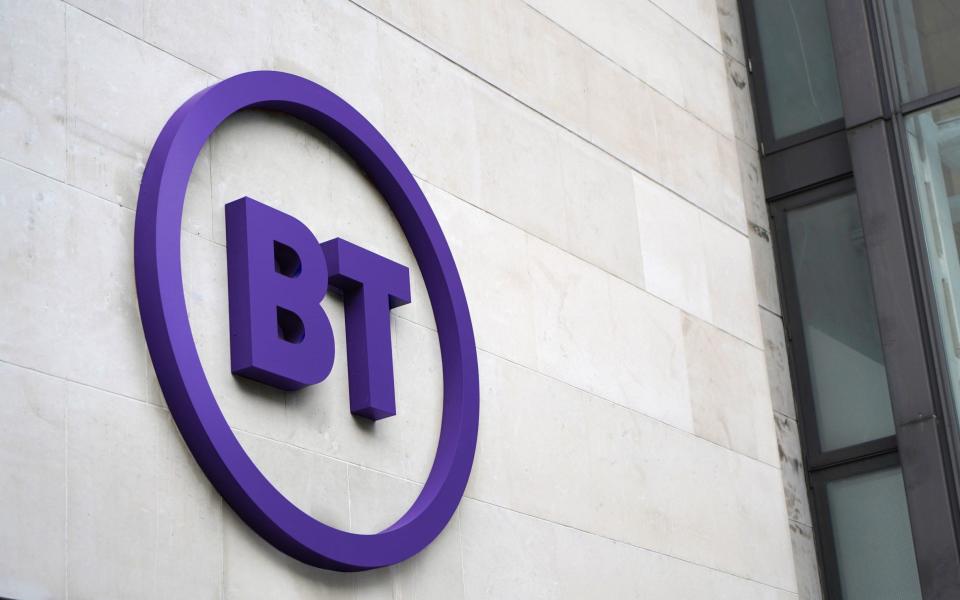
BT's sales have grown for the first time since 2017 as it raised its prices and more customers signed up for full-fibre broadband.
The telecoms behemoth posted a 1pc rise in revenue in the first quarter to £5.1bn, while profits were up 2pc to £1.9bn.
Philip Jansen, chief executive of BT, said the fibre rollout and customer connections were "both ahead of our own expectations".
The said the company was performing well operationally despite ongoing challenges in its enterprise business.
BT added that it has contingency plans in place as it gears up for a walkout by 40,000 workers tomorrow in a row over pay.
08:10 AM
Barclays profits slump after huge trading blunder
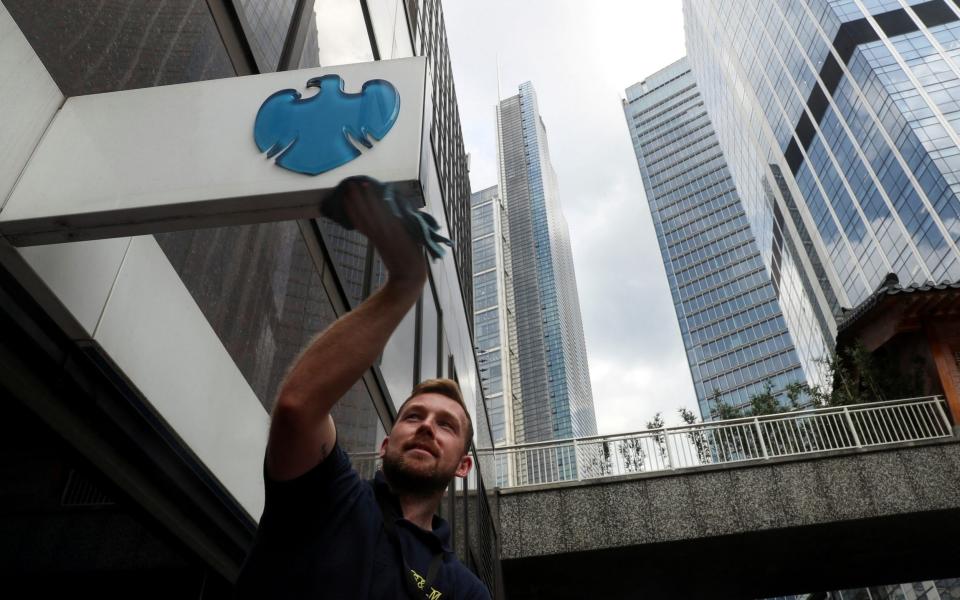
Away from energy, Barclays has suffered a 24pc slump in profits after taking a huge hit from its US trading blunder and a charge to cover loan losses as the cost-of-living crisis deepens.
The bank's profits fell to £3.7bn after it revealed a £1.5bn estimated impact from the debacle in its structured products division.
Barclays also said it put aside £165m for a potential fine for the error, which saw it sell more structured notes than it was allowed to under US rules, and is being scrutinised by regulators.
The group said that, net of tax, the bottom-line charge relating to the US trading saga stood at £581m, of which £341m was taken in the second quarter.
The lender also revealed it put aside £341m for potential loan losses as the economic outlook has weakened due to soaring inflation.
Despite this Barclays said it will pay out a dividend of 2.5p per share and launch a buyback of £500m.
CS Venkatakrishnan, chief executive of Barclays, said:
We are alert to the pressure that the rising cost of living will have on our customers and colleagues. We have a range of measures in place to help and are looking to do more.
08:03 AM
Shell boss: We're facing a tough winter
Shell chief executive Ben van Beurden issues another warning about the tough winter ahead.
"It would be foolish not to prepare for a contingency" in case Russian supplies are cut further, he says.
Van Beurden says Shell is limited the use of natural gas in its own European facilities, such as Rotterdam.
"We better be prudent", he adds.
08:01 AM
FTSE 100 opens higher
The FTSE 100 has started the day in positive territory as investors digest a deluge of corporate results.
The blue-chip index gained 0.6pc to 7,392 points.
07:57 AM
British Gas boss: We know it's hard for consumers
The boss of British Gas owner Centrica has said he expects the company's stellar growth to continue in the second half of the year, but acknowledged the difficulties for consumers.
Chris O'Shea said: "We are very aware of the difficult environment many customers are facing and we will continue supporting them."
Centrica rejoined the FTSE 100 in May after rapid growth in its share price. It's already said it expects a surge in profits this year on the back of rising energy prices.
But huge profits for such a high-profile firm are likely to sit uneasily with the public at a time when soaring energy bills push many families into poverty.
Centrica said it expects to pay around £600m in windfall tax next year, subject to wholesale prices.
07:53 AM
Shell boss hints at even higher returns
Shell's increased payouts come after the company said it would increase payouts to investors by more than 30pc of cash flow from operations, its previous limit.
The FTSE 100 group has come under pressure from activist Daniel Loeb to improve returns – and even to split up the business – so the jump in profits will be a welcome relief for bosses.
Ben van Beurden, Shell's chief executive, tells CNBC the best use for the extra cash is to buy back the company's undervalued stock. He adds that Shell will look to raise shareholder returns further in the fourth quarter if things continue as they are.
Here's more from him:
With volatile energy markets and the ongoing need for action to tackle climate change, 2022 continues to present huge challenges for consumers, governments, and companies alike.
Consequently, we are using our financial strength to invest in secure energy supplies which the world needs today, taking real, bold steps to cut carbon emissions, and transforming our company for a low-carbon energy future.
07:47 AM
Centrica and Shell share spoils with investors
Good morning.
On a busy morning for corporate results, there are two stand-out winners.
Shell and British Gas owner Centrica have both delivered a jump in profits over their most recent quarter as they cashed in on surging energy prices sparked by Russia's war in Ukraine.
The companies are sharing the spoils with investors, with Shell announcing another share buyback of $6bn. That follows $8.5bn of stock repurchases in the first half of the year.
Centrica, meanwhile, is restarting its dividend for the first time since the start of the pandemic.
The payouts could draw political ire, as they come hot on the heels of the windfall tax targeting profits of oil and gas producers.
5 things to start your day
1) UK bets the house on European energy Wholesale gas and electricity prices on both sides of the Channel are at record levels
2) Courts to be given power to award damages in Bitcoin Move would mean damages could reflect large movements in value of digital currencies
3) Facebook suffers first ever fall in revenues as advertising slows Parent company Meta warns of cuts on hiring and spending plans
4) Federal Reserve raises interest rates sharply in scramble to beat inflation US decision piles pressure on the Bank of England to stamp down harder on surging prices
5) Saudi prince invests £190m in Britain’s biggest pension provider Saudi royal Alwaleed bin Talal Al Saud has taken a stake of just over 3pc in Phoenix Group
What happened overnight
Asian shares made cautious gains this morning as investors scented a possible slowdown in the pace of US rate hikes, comforting bond markets and sending the dollar to a three-week low on the yen.
As expected, the US Federal Reserve raised rates 75 basis points but did note some softening in recent data.
Just the hint of a less aggressive Fed was enough to send MSCI's broadest index of Asia-Pacific shares outside Japan up 0.5pc. Japan's Nikkei added 0.3pc and South Korea 0.9pc. Chinese blue chips firmed 0.6pc.
Coming up today
Corporate: Diageo (full-year results); Airtel Africa, Alliance Trust, Anglo American, BAE Systems, Barclays, Centrica, FDM Group, Greencoat UK Wind, Hammerson, Inchcape, Indivior, ITV, National Express, Rathbone Brothers, Relx, Rentokil, Schroders, Scottish American Investment Company, Segro, Shell, Smith & Nephew, St James’s Place, Vesuvius, Weir (interims); AVEVA, BT, CMC Markets, CVS Group, Discoverie Group, Evraz (trading update)
Economics: GDP (US), jobless claims (US), consumer confidence (EU), business climate (EU)
